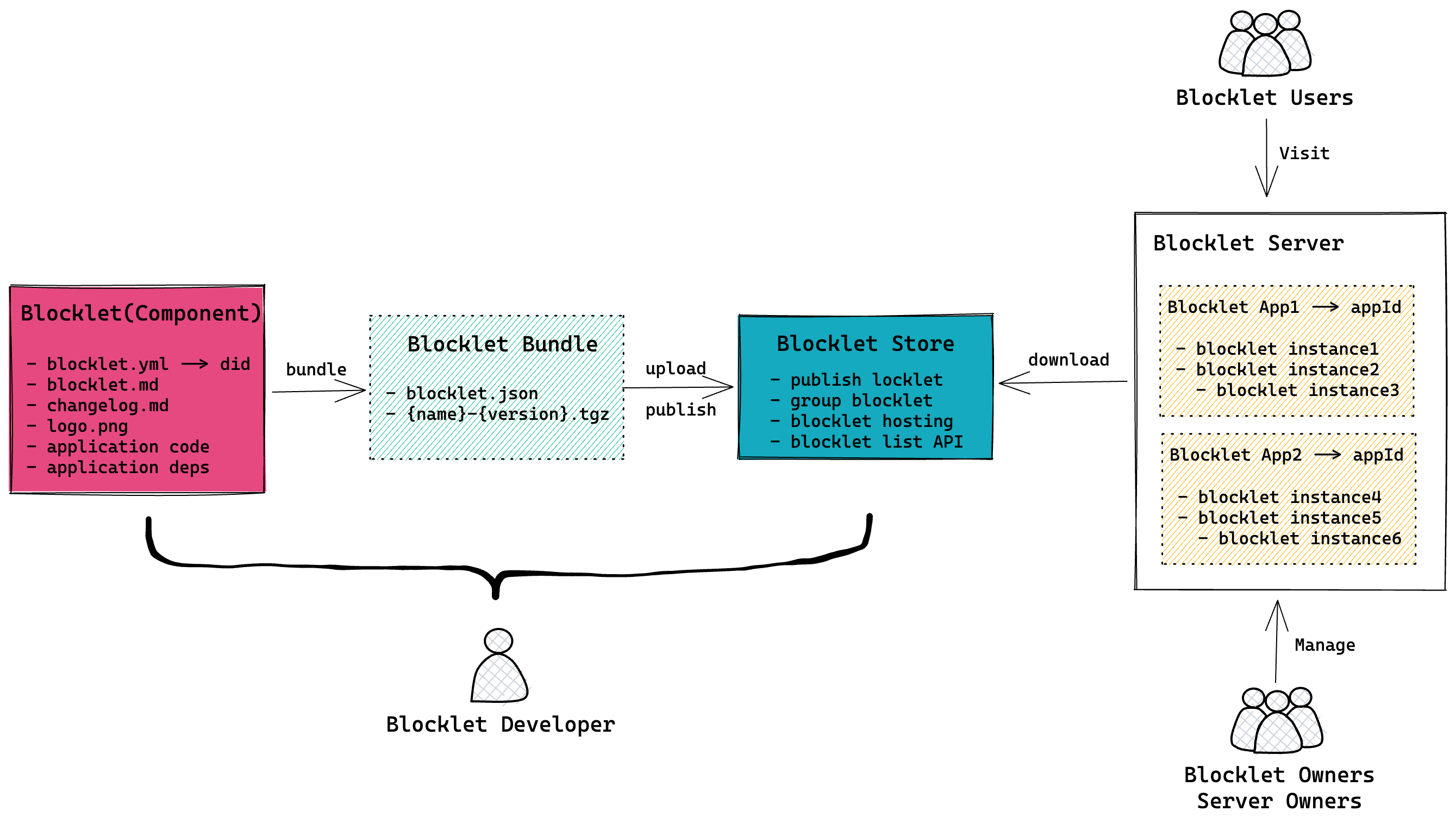Welcome
Getting Started
How to Guides
Application vs Blocklet
Create Blocklet
Compose Blocklets
Develop Blocklet
User and Passport
Communicate with DID Wallet
Blocklet Storage
Using Blocklet Preferences
Using Blocklet Logger
Add PWA Integration to Blocklet
Build blocklet for profit [deprecated]
Bundle your blocklet
Manage Blocklet Versions
Publish your blocklet to the world
Deploy your blocklet
Read/Write blockchain in blocklet
Operation your blocklet
Reference Guides
DID Connect
blocklet.yml
blocklet.js
Blocklet SDK (Node.js)
Blocklet SDK (Browser)
Blocklet Service
Blocklet CLI
Blocklet Server CLI
Blocklet UI
Blocklet GitHub Actions
Blocklet Studio
Blocklet Manager
Security
Performance
Developer Best Practices.
Known Issues or Limitations
Setup Blocklet Server
WebHooks
OAuth Server
Access Key
MCP Servers
Conceptual Guides
Frequently Asked Questions
Understanding Blocklet
The core concepts in the Blocklet ecosystem and the relationships between the concepts are shown in the following diagram.

What is Blocklet?#
- Blocklets are the basic unit of application development, delivery, and operation
- Blocklets follow the same protocol, enjoy the same services, and when combined together can perform very powerful functions
- Blocklets are combinable, in a way very similar to Lego blocks
- Blocklets are uniquely identified by a Blocklet DID, and the DIDs in each Blocklet Store are non-repeatable
What is Blocklet Component?#
- A Blocklet Component is specifically a Blocklet that can be used in combination, or not, as declared in blocklet.yml
- Blocklet Components can usually be used both independently and in combination, and can behave differently in both modes
- Blocklet Components can contain other Blocklet Components, and this containment relationship can be nested, just as a codebase published in an NPM can depend on other codebases published on the NPM. However, from a performance point of view, there is a limit to the depth of nesting of Blocklet Components.
What is Blocklet Server?#
- Blocklet Server is the software that provides the complete runtime environment, basic services, and management functions for Blocklet
- The data generated when Blocklet Server is running belongs to the owner of Blocklet Server only.
- Blocklet Server is uniquely identified by an immutable DID generated at the time of Blocklet Server creation and displayed in the Blocklet Server Console
- Anyone can run their own Blocklet Server on their own computer without license and without payment
What is Blocklet Bundle?#
- A Blocklet Bundle is a package built using blocklet bundle that can be consumed by Blocklet Server
- Blocklet Bundles are usually uploaded and hosted by developers in the Blocklet Store, and can be hosted on any accessible network.
- A Blocklet Bundle typically contains the following two files.
.blocklet/release
├── blocklet.json
└── static-demo-blocklet-1.4.0.tgzblocklet.jsonBlocklet description file calculated from blocklet.yml{name}-{version}.tgzcontains the various files needed for the blocklet runtime, including the source code after the build, external dependencies- Theoretically, the two files could be hosted in different places, as long as
blocklet.jsoncontains the correct zip address
What is Blocklet App?#
- A Blocklet App is an entity that is installed, runs in the Blocklet Server, and can provide services to the public.
- The service behind a Blocklet App can consist of a single or multiple Blocklet Instances
- The unique identifier of a Blocklet App is the appId, which can be obtained from Blocklet SDK and blocklet.js
- The same Blocklet Bundle running in a different Blocklet Server belongs to a different Blocklet App
- The same Blocklet Bundle running in the same Blocklet Server also belongs to a different Blocklet App
- A Blocklet App can have any number of users depending on the use case
- A Blocklet App can have only one blocklet owner, but can have multiple administrators
What is Blocklet Instance?#
- Each component of a running Blocklet App is a Blocklet Instance, which is like an instance generated from a class
- Each Blocklet Instance runs in its own separate process, with its own process identity, environment variables, and data directory
Translated with www.DeepL.com/Translator (free version)